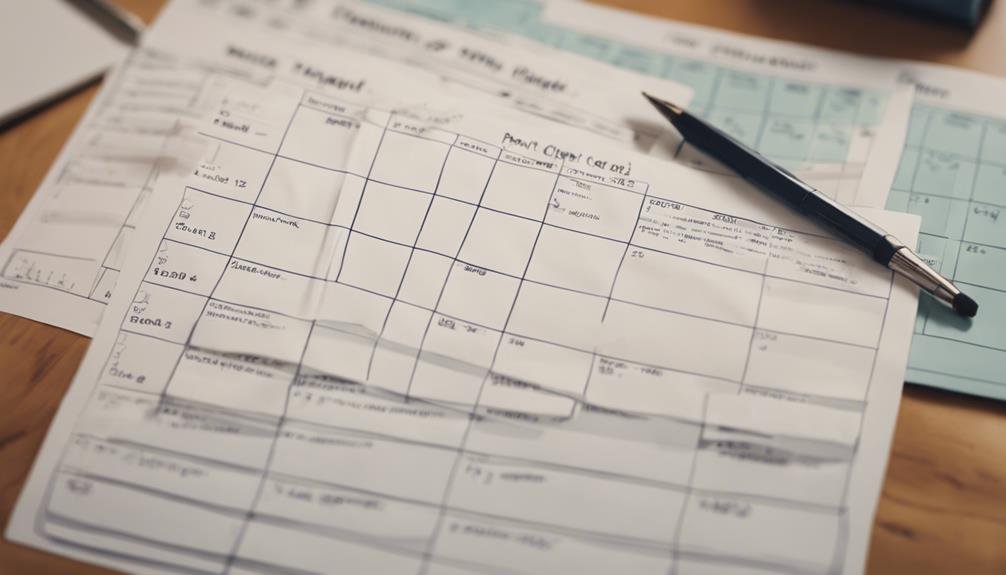"Cherishing Little Steps - A Haven for Baby and Family Journeys"
Preparing for Parent-Teacher Conferences: A Guide for Parents
You might think that parent-teacher conferences are just another school event to attend, but they hold significant value in your child's educational journey.
As a parent, approaching these meetings with a strategic mindset can make a considerable difference in understanding and supporting your child's academic growth.
From setting clear expectations to developing effective communication strategies, each step plays an essential role in maximizing the benefits of these conferences.
Stay tuned to discover how you can prepare effectively for your next parent-teacher conference.
Key Takeaways
- Establish clear goals and manage emotions effectively for productive discussions.
- Identify strengths and challenges to tailor support and celebrate achievements.
- Develop a communication plan to enhance collaboration and monitor progress together.
- Discuss actionable strategies with teachers, involve parents, and follow up for continued engagement.
Understanding the Purpose

Understanding the purpose of parent-teacher conferences is essential for fostering effective communication and collaboration between parents and educators. These meetings serve as a crucial component in your child's education journey. By comprehending this purpose, you can actively participate in creating a communication plan that guarantees your child's success in school.
A communication plan involves establishing clear objectives for the parent-teacher conference. Before the meeting, consider what specific information you want to gather or discuss with the teacher. Are there any concerns or questions you have regarding your child's academic progress or behavior in class? Setting these goals will guide the conversation and help you make the most of the limited time available during the conference.
Understanding the purpose of the conference allows you to approach it with a positive and proactive mindset. Remember, these meetings are opportunities to work together with the teacher to support your child's learning and development. By having a clear communication plan in mind, you can make sure that the conference is productive and beneficial for your child's educational journey.
Setting Clear Expectations
To guarantee a productive parent-teacher conference, establish clear expectations beforehand by outlining specific goals and topics you wish to address with the teacher. Setting boundaries and managing emotions during these conferences is important for effective communication. To help you navigate this process smoothly, consider the following tips:
| Setting Boundaries | Managing Emotions |
|---|---|
| Clearly define the topics you want to discuss. | Stay calm and composed during the conversation. |
| Determine what outcomes you hope to achieve. | Listen actively to the teacher's feedback. |
| Communicate your expectations respectfully. | Acknowledge any concerns or frustrations you may have. |
| Be open to collaboration and compromise. | Take notes to reflect on the discussion later. |
Reviewing Your Child's Progress

When reviewing your child's progress, it's important to assess their growth and learning development in various areas to gain a thorough understanding of their academic performance.
Parent involvement in your child's education is vital for their success. Here are some key points to take into account during the progress review:
- Academic Achievements: Evaluate your child's performance in different subjects to identify strengths and areas needing improvement.
- Social Development: Take into account how well your child interacts with peers and teachers, as social skills are essential for a well-rounded education.
- Study Habits: Review your child's study routines and time management skills to make sure they're effectively preparing for exams and assignments.
- Emotional Well-being: Take note of any changes in your child's behavior or mood, as emotional health can have a significant impact on academic performance.
Identifying Strengths and Challenges
Evaluating your child's strengths and challenges is essential for tailoring their educational support effectively. Understanding what they excel in and where they may need extra help can guide you in setting realistic educational goals and fostering a supportive learning environment at home. By recognizing their strengths, you can celebrate their achievements and build their confidence. Identifying their challenges allows you to provide targeted assistance and resources to help them overcome obstacles and improve their performance.
—
| Strengths | Weaknesses |
|---|---|
| Strong in math | Struggles with spelling |
| Excellent problem-solving skills | Difficulty staying organized |
| Enjoys reading aloud | Shyness in group settings |
| Articulate in discussions | Procrastinates on assignments |
| Shows empathy towards peers | Needs help focusing during lectures |
—
Consider how your family dynamics may impact your child's academic journey. Open communication and collaboration between parents, teachers, and the student are crucial in addressing both strengths and weaknesses effectively to support their educational growth.
Developing a Communication Plan

Begin by outlining a structured communication plan to enhance collaboration between parents, teachers, and your child in optimizing academic progress and addressing any challenges effectively. Parent involvement and effective communication are key components in guaranteeing a successful partnership that supports your child's educational journey.
Here are four essential steps to contemplate:
- Regular Updates: Schedule periodic meetings or phone calls with your child's teacher to stay informed about their progress and any areas that may need additional attention.
- Open Dialogue: Encourage your child to share their thoughts and concerns about school, allowing them to feel heard and supported.
- Use of Communication Tools: Explore the use of online platforms or apps recommended by the school to track assignments, grades, and communicate with teachers conveniently.
- Establish Clear Channels: Guarantee all parties involved understand the preferred methods of communication, whether it's through emails, phone calls, or in-person meetings.
Establishing Goals Together
To enhance collaboration between parents, teachers, and your child in optimizing academic progress and addressing challenges effectively, it is crucial to establish goals together from the onset of the academic year. Collaborative planning guarantees that everyone is aligned towards shared objectives, fostering a supportive environment for your child's learning journey. By setting clear goals collectively, you can monitor progress, celebrate achievements, and address any obstacles promptly.
Consider sitting down with your child and their teacher to establish these goals. Here is a table to help you structure your collaborative planning session:
| Goal | Action Steps | Timeline |
|---|---|---|
| Improve Math | Weekly practice sessions | By end of month |
| Enhance Reading | Read together daily | Ongoing |
| Develop Study Habits | Create a study schedule | Next two weeks |
| Increase Participation | Encourage class involvement | Throughout year |
Gathering Relevant Materials

When preparing for parent-teacher conferences, make sure you gather all relevant materials pertaining to your child's academic progress and performance. Organizing materials in advance can greatly enhance the effectiveness of your discussions with the teacher.
Here are some key items you should consider bringing with you:
- Recent Assignments: Having a selection of your child's recent assignments can provide valuable insights into their strengths and areas needing improvement.
- Test Scores: Test scores can offer a snapshot of how your child is performing academically and can guide the discussion on areas that may need more focus.
- Behavioral Reports: Any reports on your child's behavior in class can help in understanding how they're engaging with the learning environment.
- Achievement Records: Bringing along any records of awards or achievements your child has received can give the teacher a more detailed view of your child's abilities.
Parent involvement in gathering these materials showcases your dedication to your child's education and can foster a productive dialogue during the conference.
Creating a List of Questions
Consider compiling a list of insightful questions to maximize the effectiveness of your parent-teacher conference experience. By preparing questions in advance, you can make sure that you cover all relevant topics and gain a deeper understanding of your child's progress and classroom environment.
To enhance engagement during the conference, consider asking about specific examples of your child's work or behavior. This can provide valuable insights into their strengths and areas for improvement. Additionally, inquire about any upcoming projects or assignments to stay informed and offer support at home.
Communication tips can also play an important role in shaping the dialogue during the conference. To foster open and constructive communication, consider asking about the best way to stay in touch with the teacher throughout the school year. Discussing preferred methods of communication can help establish a strong partnership between home and school.
Moreover, inquire about any resources or strategies that can support your child's learning outside of the classroom. By actively participating in the conversation and seeking clarification when needed, you can make the most out of your parent-teacher conference.
Practicing Active Listening

Practicing active listening during parent-teacher conferences is essential for gaining a thorough understanding of your child's educational progress and fostering effective communication with the teacher. Engaging in attentive listening requires more than just hearing words; it involves active engagement and genuine interest in what the teacher is communicating.
Here are some key strategies to help you master active listening during the conference:
- Maintain eye contact to show your attentiveness and interest.
- Avoid interrupting the teacher; let them finish their thoughts before responding.
- Summarize what you've heard to make sure you've understood correctly.
- Ask clarifying questions to explore deeper into specific points or concerns.
Discussing Actionable Strategies
To effectively utilize parent-teacher conferences, it's important to explore actionable strategies that can positively impact your child's educational journey. Actionable steps involve effective communication between you and your child's teacher. During the conference, discuss specific ways you can be more involved in your child's education. This could include setting up a routine for homework, creating a conducive study environment at home, or establishing a reading schedule. By actively participating in your child's learning process, you can greatly contribute to their success.
Effective communication is key to fostering a collaborative relationship with the teacher. Be open to feedback and suggestions, and work together to address any challenges your child may be facing. Additionally, inquire about ways to support your child's learning outside of the classroom. By engaging in these discussions, you can develop a holistic approach to supporting your child's academic growth and overall well-being. Remember, parent involvement is an important factor in ensuring student success.
Following Up After the Conference

After engaging in constructive discussions during the parent-teacher conference, maintaining proactive communication and implementing agreed-upon strategies is crucial for supporting your child's academic progress. Following up with the teacher post-conference guarantees that the momentum gained from the meeting continues positively. Here are some actionable steps and communication strategies to contemplate:
- Regular Updates: Request periodic progress updates from the teacher to stay informed about your child's academic performance.
- Implement Strategies: Act on the agreed-upon strategies discussed during the meeting to support your child's learning at home.
- Encourage Student Feedback: Prompt your child to share their thoughts on the strategies being used and how they feel about their progress.
- Parent Involvement: Stay engaged with your child's education by attending school events, volunteering, and communicating with teachers regularly.
Reflecting on the Experience
Upon reflecting on the parent-teacher conference experience, it is essential to contemplate the key takeaways and insights gained to further support your child's academic journey. From a parent perspective, these conferences offer invaluable opportunities to understand your child's progress, strengths, and areas for improvement directly from the teacher. Reflecting on the insights shared by the teacher can help you tailor your support at home to complement the strategies being implemented in the classroom.
| Parent Perspective | Teacher Insights |
|---|---|
| Listen actively | Share specific examples |
| Ask clarifying questions | Provide growth areas |
| Take notes | Offer suggestions |
| Discuss action plan | Collaborate on solutions |
Frequently Asked Questions
How Can Parents Best Support Their Child's Social and Emotional Development in Addition to Academic Progress?
To best support your child's social and emotional development, engage in open conversations, validate their feelings, and model healthy behaviors. Encourage social skills through playdates, praise their efforts, and provide a safe space for them to navigate friendships and manage emotions.
What Resources Are Available for Parents to Help Their Child With Specific Learning Challenges Identified During the Conference?
Wondering how to best support your child with specific learning challenges identified during the conference? Explore parent workshops and online resources for guidance. Consider tutoring services and educational apps to provide targeted assistance for their academic needs.
How Can Parents Collaborate With Teachers to Address Any Behavioral Issues or Concerns That May Arise?
To address behavioral issues, collaborate with teachers. Implement behavior management strategies together. Share insights, concerns, and successes. Establish consistent communication. Develop a plan that supports your child's needs both at school and at home.
Are There Any Extracurricular Activities or Programs That May Benefit Their Child's Overall Growth and Development?
Exploring extracurricular opportunities can enhance your child's skill development. Enrichment programs offer talent nurturing chances. Consider activities like sports, arts, or academic clubs to support their overall growth and development outside of regular school hours.
How Can Parents Stay Involved and Engaged in Their Child's Education on a Day-To-Day Basis, Beyond Just Parent-Teacher Conferences?
To stay involved daily in your child's education, engage in conversations about their school day, help with homework, and create a structured routine. Consistency in showing interest and offering support has a lasting impact on their learning journey.
Conclusion
To sum up, preparing for parent-teacher conferences is vital for your child's academic success. By understanding the purpose, setting clear expectations, and reviewing your child's progress, you can guarantee a productive meeting.
Remember, these conferences are meant to help your child thrive and succeed in school. So, embrace the opportunity to collaborate with teachers and address any concerns.
Don't let any apprehension hold you back from being an active participant in your child's education.


